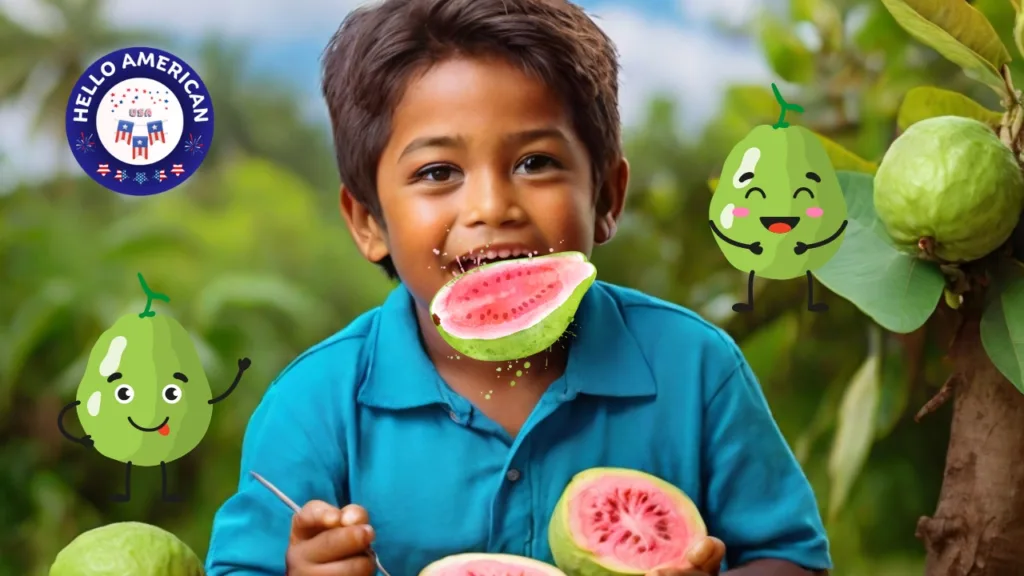Guava is a tropical fruit that is not only delicious but also packed with nutritional benefits.
Here are 29 health advantages and potential disadvantages of eating guava fruit:
Advantages:
- High in Vitamin C: Guava is an excellent source of vitamin C, supporting immune function and skin health.
- Rich in Dietary Fiber: Guava is high in fiber, promoting digestive health and aiding in constipation prevention.
- Antioxidant Properties: Guava contains antioxidants that help neutralize free radicals in the body, supporting overall health.
- Vitamin A Content: Guava provides vitamin A, essential for vision health and immune function.
- Potassium Source: The potassium content in guava contributes to heart health and helps regulate blood pressure.
- Folate for Pregnancy: Guava is a good source of folate, important for fetal development during pregnancy.
- Improved Digestion: The fiber content in guava aids in digestion and helps maintain a healthy digestive system.
- Anti-Inflammatory Effects: Some compounds in guava may have anti-inflammatory properties.
- Low in Calories: Guava is a low-calorie fruit, making it a healthy snack option.
- Blood Sugar Regulation: The dietary fiber in guava may help regulate blood sugar levels.
- Weight Management: Guava’s low calorie and high fiber content can contribute to weight management.
- Vitamin K: Guava provides vitamin K, important for blood clotting and bone health.
- Copper Content: Guava contains copper, which is essential for various physiological processes in the body.
- Improved Skin Health: Antioxidants in guava contribute to healthy skin by protecting against oxidative damage.
- Aid in Wound Healing: Vitamin C in guava is crucial for collagen synthesis, supporting wound healing.
- Reduced Risk of Chronic Diseases: Antioxidants in guava may help lower the risk of chronic diseases.
- Immune System Support: Vitamin C boosts the immune system and helps the body fight infections.
- Reduced Risk of Macular Degeneration: Antioxidants in guava may lower the risk of age-related macular degeneration (AMD).
- Improved Heart Health: The potassium and fiber in guava support cardiovascular health.
- Anti-Cancer Properties: Some compounds in guava have been studied for their potential anti-cancer effects.
- Lowered LDL Cholesterol: Guava may contribute to reducing LDL (bad) cholesterol levels.
- Improved Blood Circulation: Guava’s potassium content supports healthy blood circulation.
- Reduced Risk of Stroke: Regular consumption of guava has been associated with a lower risk of stroke.
- Natural Anti-Diarrheal: Guava may have anti-diarrheal effects due to its fiber content.
- Alkalizing Properties: Guava has alkalizing effects on the body, promoting a balanced pH.
- Reduced Inflammation: Some compounds in guava may help reduce inflammation in the body.
- Improved Vision Health: Vitamin A in guava is essential for maintaining healthy vision.
- Aid in Muscle Recovery: The vitamin C content in guava supports muscle recovery after exercise.
- Bone Health: Guava provides minerals like calcium and phosphorus, essential for maintaining strong and healthy bones.
Disadvantages:
- Potential Allergies: Some individuals may be allergic to guava, although this is rare.
- Individual Reactions: Like any food, individual reactions to guava can vary, and excessive consumption may cause digestive discomfort in some people.
It’s important to note that the benefits of consuming guava may vary among individuals, and moderation is key. If you have specific health concerns or conditions, consulting with a healthcare professional or a registered dietitian is advisable.


🍈 Here’s an overview of guava fruit:
1. Appearance:
- Guavas come in different varieties, but common ones are typically round or pear-shaped.
- The skin can range from green to yellow, and the flesh inside is usually pink, white, or yellow.
2. Nutritional Content (per 100 grams):
- Calories: 68
- Carbohydrates: 14 grams
- Dietary Fiber: 5.4 grams
- Sugars: 9 grams
- Protein: 2.6 grams
- Fat: 0.9 grams
- Vitamins and Minerals:
- Vitamin C: 228 mg (about 380% of the Recommended Daily Intake or RDI)
- Vitamin A: 624 IU (about 12% of RDI)
- Potassium: 417 mg (about 9% of RDI)
- Folate (B9): 49 µg (about 12% of RDI)
- Vitamin K: 2.6 µg (about 3% of RDI)
- Copper: 0.23 mg (about 10% of RDI)
3. Health Benefits:
- High in Vitamin C: Guava is an excellent source of vitamin C, which supports immune function and skin health.
- Rich in Dietary Fiber: Guava is high in fiber, promoting digestive health and aiding in constipation prevention.
- Antioxidant Properties: Guava contains antioxidants that help neutralize free radicals in the body, supporting overall health.
- Vitamin A Content: Guava provides vitamin A, essential for vision health and immune function.
- Potassium Source: The potassium content in guava contributes to heart health and helps regulate blood pressure.
- Folate for Pregnancy: Guava is a good source of folate, important for fetal development during pregnancy.
- Improved Digestion: The fiber content in guava aids in digestion and helps maintain a healthy digestive system.
- Anti-Inflammatory Effects: Some compounds in guava may have anti-inflammatory properties.
- Low in Calories: Guava is a low-calorie fruit, making it a healthy snack option.
- Blood Sugar Regulation: The dietary fiber in guava may help regulate blood sugar levels.
4. Culinary Uses:
- Guava can be eaten fresh, either on its own or added to fruit salads.
- It is used to make juices, smoothies, and jams.
- Guava is a versatile fruit and can be incorporated into both sweet and savory dishes.
5. Considerations:
- Guava seeds are edible but can be hard. Some people choose to spit them out or remove them before eating.
- The flavor profile of guava can vary between varieties, with some being more sweet and others more tart.
Guava is a nutritious and flavorful fruit that can be a valuable addition to a well-balanced diet. It provides a range of vitamins, minerals, and antioxidants that contribute to overall health. As with any food, moderation is key, and individual dietary needs may vary.


Red and pink guava varieties are popular tropical fruits known for their sweet and aromatic flavor. Here’s a brief overview of red and pink guava fruit:
Red Guava:
- Appearance:
- Red guavas typically have a greenish skin that turns reddish as the fruit ripens.
- The inner flesh is reddish-pink, and the seeds are embedded in the soft, sweet pulp.
- Flavor and Aroma:
- Red guavas are known for their sweet and fragrant aroma.
- The flavor is a delightful combination of sweetness and a slightly tart or tangy undertone.
- Nutritional Content:
- Similar to other guava varieties, red guavas are rich in vitamin C, dietary fiber, and various antioxidants.
- The red color of the flesh is due to the presence of additional pigments like lycopene, which is also found in tomatoes and watermelon.
- Culinary Uses:
- Red guavas can be eaten fresh, sliced, or diced.
- They are commonly used in fruit salads, smoothies, juices, jams, and desserts.
Pink Guava:
- Appearance:
- Pink guavas often have a greenish-yellow skin that turns yellow as the fruit ripens.
- The inner flesh is pinkish or salmon-colored, with small seeds scattered throughout.
- Flavor and Aroma:
- Pink guavas have a sweet and aromatic flavor with a hint of muskiness.
- The aroma is pleasant and tropical, adding to the overall sensory experience.
- Nutritional Content:
- Pink guavas share similar nutritional characteristics with other guava varieties, offering a rich source of vitamin C, fiber, and antioxidants.
- The pink color is attributed to the presence of pigments like carotenoids.
- Culinary Uses:
- Pink guavas are versatile and can be enjoyed fresh, juiced, or blended into smoothies.
- They are used in fruit salads, desserts, jams, and sauces.
General Tips for Enjoying Red and Pink Guava:
- Selecting Ripe Guavas:
- Look for guavas that yield slightly to gentle pressure.
- A fruity aroma near the stem end indicates ripeness.
- Seed Handling:
- Guava seeds are edible but can be hard. Some people prefer to remove them before consuming or use seedless varieties.
- Culinary Applications:
- Guavas can be enjoyed on their own, added to fruit salads, blended into smoothies, or used in various culinary creations.
- Nutrient Boost:
- Guavas are nutrient-dense, providing a boost of vitamin C, fiber, and other essential nutrients.
Both red and pink guavas offer a delightful eating experience and contribute to a healthy diet. They are not only delicious but also versatile in the kitchen, allowing for creative culinary applications.


